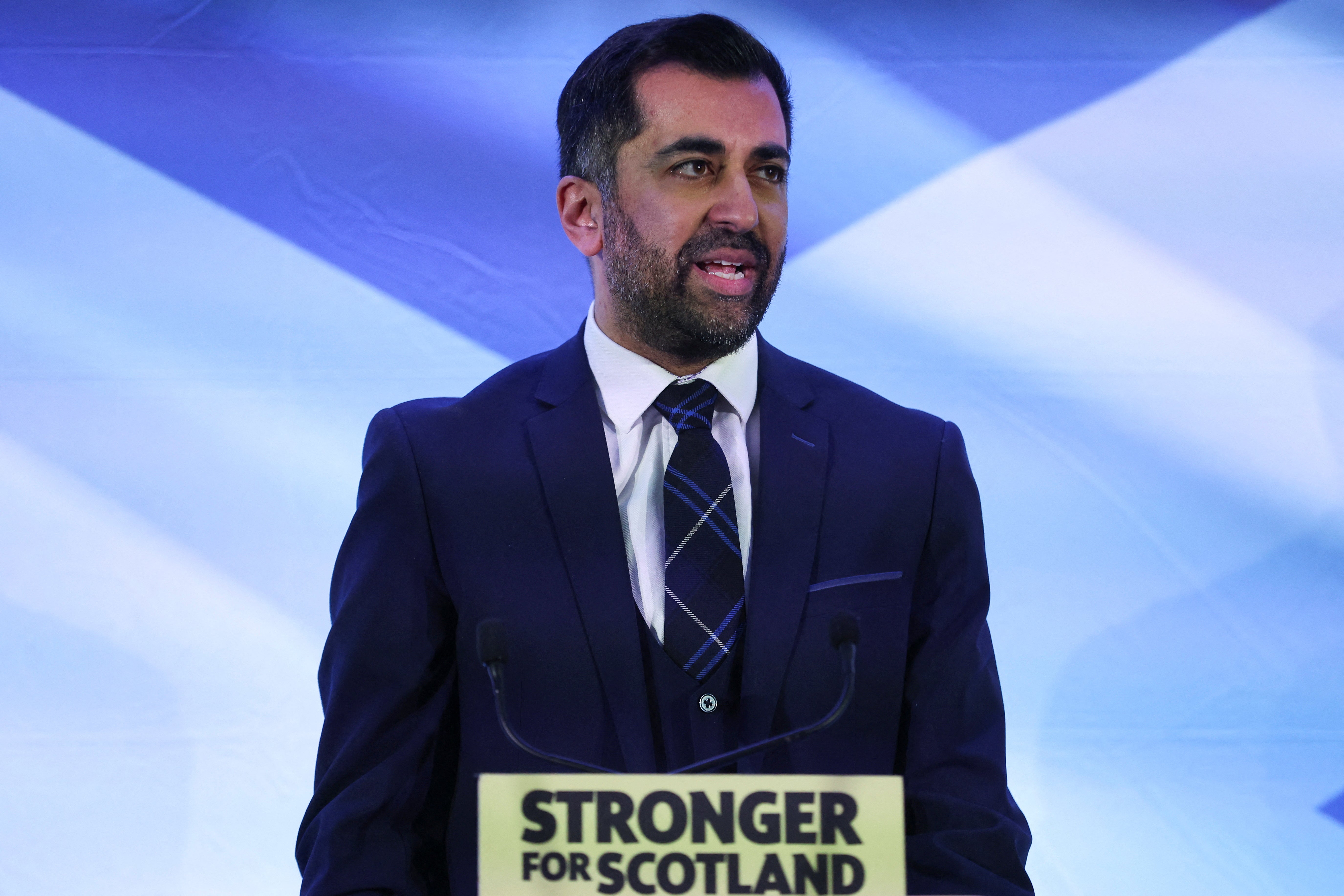
Humza Yousaf has narrowly won the bitterly-fought contest to replace Nicola Sturgeon as the SNP leader and Scotland’s first minister, winning by just over 2,000 votes.
The 37-year-old is set to become Scotland’s youngest first minister and the first person from a minority ethnic background to hold the post after the result was announced at Murrayfield Stadium in Edinburgh.
Viewed as the continuity candidate, Mr Yousaf said he felt like “the luckiest man in the world” to lead the party he “loves so dearly” – calling it “the greatest honour and privilege” of his life.
Kate Forbes – the 32-year-old finance secretary who repeatedly clashed with Mr Yousaf over his record – finished runner-up. Ash Reagan, the outsider with the most hardline position on Scottish independence, finished third.
Ms Regan took just 5,599 (11 per cent) of the votes in the first round of the members’ ballot. When second preferences were distributed, Mr Yousaf took 26,032 (52 per cent) and Kate Forbes took 23,890 (48 per cent).
It has not been a smooth process, with acrimonious clashes between candidates and the dramatic resignation of chief executive Peter Murrell – Ms Sturgeon’s husband – following controversy over the transparency of SNP membership numbers.
Interim chief executive Mike Russell admitted the party was in a “tremendous mess” after the membership row, while even Ms Sturgeon described the contest as “fractious” and acknowledged the party was suffering from “growing pains”.
Polls had made Mr Yousaf favourite among SNP voters, but faces an uphill battle to win over others in Scotland. An Ipsos Scotland survey found Ms Forbes was more popular with the public – with a net rating of minus 8 per cent, compared with Mr Yousaf on minus 20.
Mr Yousaf said in his victory speech on Monday that he would lead Scotland “in the interest of all of our citizens”, whatever their political allegiance.
He added: “I will work every minute of every day to earn and re-earn your respect and your trust … There will be no empty promises or easy soundbites when the issues in front of us are difficult and complex. Because government is not easy and I won’t pretend that it is.”
Ms Sturgeon announced in February that she would resign, but did not put a succession plan in place and left the Scottish independence push at an impasse. She departed after Rishi Sunak’s government and the Supreme Court refused to allow Holyrood to hold its own referendum.
Ms Regan – the outsider who branded the other two candidates “wishy washy” on independence – vowed to make every single election a “de facto” referendum on separation until the Westminster government gives in.

While Mr Yousaf vowed to push the independence campaign into “fifth gear”, he also suggested during the contest that the SNP had to rethink its strategy – saying the party had to win “a consistent majority for independence” before legal obstacles would “disappear”.
The new SNP leader said on Monday: “To those in Scotland who don’t quite yet share that passion that I do for independence, I will aim to earn your trust by continuing to ensure that we govern well [and] focusing on the priorities that matter to all of us.”
Scottish Labour leader Anas Sarwar has called for a Holyrood election – though one is not due to 2026 – once Mr Yousaf takes office. He also the BBC: “I don’t think Humza Yousaf is up to the task, to be frank, of the big challenges now facing Scotland.”
Mr Sarwar also said the end of the Sturgeon era presents a major opportunity for Scottish Labour – with party strategists hoping to win 20 seats at the next general election.

The Scottish Labour leader told Chopper’s Politics podcast that Ms Sturgeon’s exit will make it “easier for us to achieve a Labour government” – describing Mr Yousaf and the other two candidates as “not in her league”.
Labour peer George Foulkes told The Independent Mr Yousaf’s victory “puts independence on a long string”. He added: “There’s no way forward for them and he doesn’t have a plan. It’s good news for Labour, because we’ll use Kate Forbes criticism of his record at every opportunity.”
Mr Sturgeon – who had warned candidates not to “throw the baby out with the bath water” – congratulated Mr Yousaf on his victory. She said: “He will be an outstanding leader and first minister and I could not be prouder to have him succeed me.”
Of the three candidates, only Mr Yousaf has said he would continue to fight the UK government in court after Mr Sunak and his ministers blocked Holyrood’s gender self-ID legislation.
The result will come as a relief for the SNP’s left-wing coalition partners, the Scottish Greens, who unanimously voted to support Mr Yousaf in becoming first minister.
The Greens had expressed concerns about Ms Forbes – a devout Christian who said he would have voted against same-sex marriage and wanted to delay the gender self-ID bill.
While Ms Forbes represents a rural constituency and was viewed as pro-business, Mr Yousaf is from the urban constituency of Glasgow Pollok and is seen as more in favour of wealth redistribution.
Stephen Noon, chief strategist for the pro-independence Yes campaign in 2014, said the close result suggested the SNP would continue to balance the two urges. “This has long been a creative dynamic for the party and can serve us well again.”







